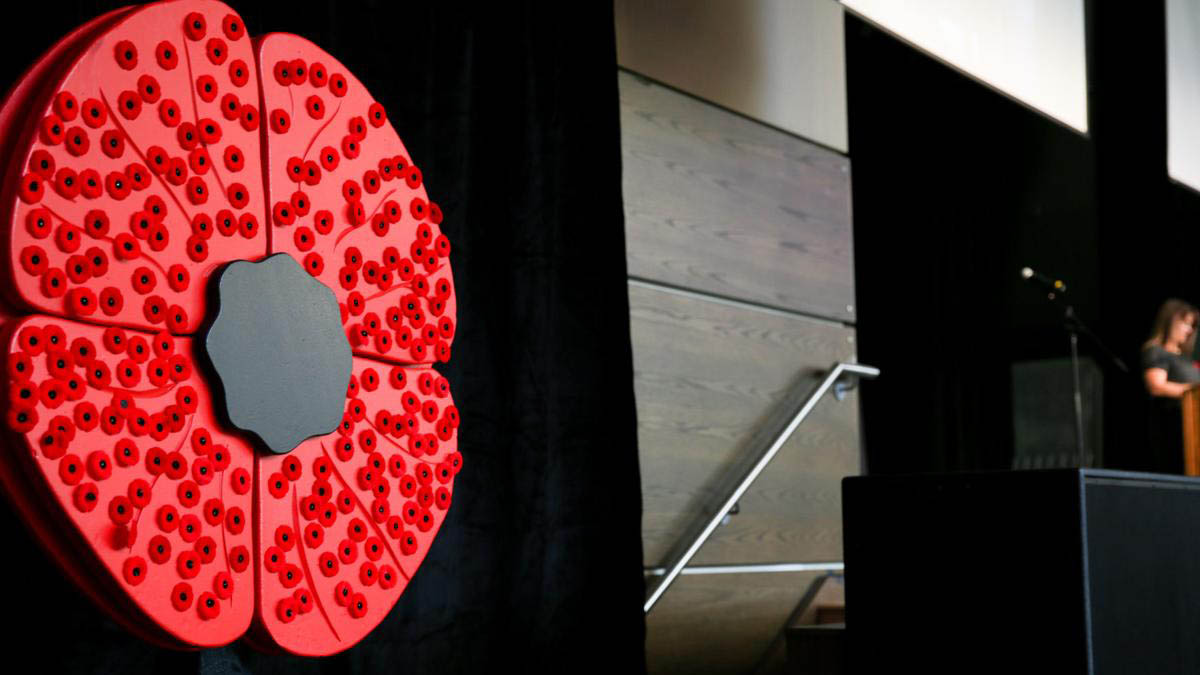"In Flanders Fields", with notes from prof. David Bentley, scholar of Canadian poetry at Western University
 CREDIT: GAZETTE STAFF
CREDIT: GAZETTE STAFFDuring the Remembrance Day ceremony in Mustang Lounge, Nov. 10, 2017.
LONDON (CUP) —
In Flanders fields the poppies blow
Between the crosses, row on row,
That mark our place; and in the sky
The larks, still bravely singing, fly
Scarce heard amid the guns below.
We are the Dead. Short days ago
We lived, felt dawn, saw sunset glow,
Loved and were loved, and now we lie
In Flanders fields.
Take up our quarrel with the foe:
To you from failing hands we throw
The torch; be yours to hold it high.
If ye break faith with us who die
We shall not sleep, though poppies grow
In Flanders fields.
Lieutenant-colonel John McCrae wrote “In Flanders Fields” in May 1915 during the Second Battle of Ypres in western Belgium, where he was serving as brigade-surgeon and major, and second-in-command of the 1st Brigade of the Canadian Field Artillery. The poem was initially published in the British satirical magazine Punch on Dec. 8, 1915 and quickly became widely known.
In due course, the poem provided the impetus for the transformation of the red poppy into a token of remembrance of those who died in the First World War and then subsequent conflicts. The presence of the scarlet corn poppies that inspired the poem at Ypres in 1915 stems from the fact that poppies are among the first plants to grow when the earth has been disturbed, a phenomenon observed on other battlefields in Western Europe during the previous century.
At first glance “In Flanders Fields” may seem very simple and straightforward, but this is deceptive. In structure, it is a “rondeau,” a French verse form that requires great skill on account of its stringent requirements: it must consist of three stanzas based on two rhymes only, and the last lines of the second and third stanzas (where a third rhyme is permitted) must repeat the opening words of the first line.
Two aspects of the poem are frequently misunderstood: “poppies blow” does not mean that they are being ruffled by a breeze but that they are in bloom; and the logic of the final statement by the collective voice of the “Dead” — “If ye break faith with us who die / We shall not sleep, though poppies grow / In Flanders Fields” — turns on the fact that before the poppy became a token of remembrance it was traditionally used as a symbol of sleep.
— David Bentley
Interrobang editor’s note: Original headline has been altered for formatting purposes.
Editorial opinions or comments expressed in this online edition of Interrobang newspaper reflect the views of the writer and are not those of the Interrobang or the Fanshawe Student Union. The Interrobang is published weekly by the Fanshawe Student Union at 1001 Fanshawe College Blvd., P.O. Box 7005, London, Ontario, N5Y 5R6 and distributed through the Fanshawe College community. Letters to the editor are welcome. All letters are subject to editing and should be emailed. All letters must be accompanied by contact information. Letters can also be submitted online by clicking here.















